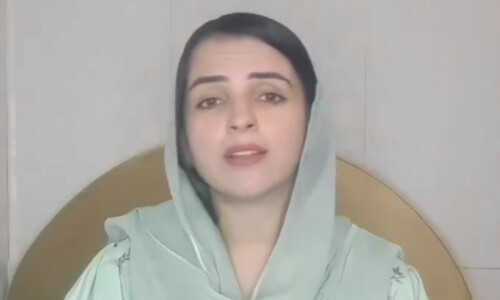
PESHAWAR, Feb 7: The Peshawar High Court on Thursday sought written reply from the President of Pakistan and Khyber Pakhtunkhwa governor through their principal secretaries in a writ petition alleging misuse of development funds meant for the tribal areas.
A two-member bench comprising PHC Chief Justice Dost Mohammad Khan and Justice Irshad Qaiser directed that the two respondents, president and governor, should clarify their position in the written reply.
The petitioner, Malik Habib Orakzai, stated that there was no transparency in utilisation of development funds in tribal areas and those were mostly misused as development schemes were awarded on recommendation of MNAs without open competition.
Advocate Ghulam Mohiuddin Malik appeared for the petitioner and contended that last year when the petition was filed the court had sought comments from the officials concerned following which an additional secretary of planning and development department of Fata Secretariat had turned up and assured the court that they had done away with the previous procedure of assignment of development schemes.
He contended that the secretary had claimed that they had been giving schemes on basis of open bidding. However, he stated that despite giving assurance to the court they had still been giving schemes to favourites on recommendation of MNAs without open bidding.
Mr Malik pointed out that few weeks ago school construction schemes in Kurram Agency worth Rs20 million were awarded on the recommendation of local MNA Munir Orakzai. Later on, he added, 18 other schemes were awarded to different contractors on the recommendation of the same MNA.
The counsel said that government officials had been committing contempt of court by violating the assurance they had given before the court. He added that tribal areas were under the supervision of president and governor acted as his agent for Fata.
The PHC chief justice observed that although Article 247 of the Constitution barred the high court from exercising jurisdiction in the tribal areas, yet the court had been looking into matters pertaining to human rights in Fata.
He observed that as the schemes pertained to education and health, therefore, the court had taken up the issue for hearing.
Meanwhile, the bench set aside conviction of a juvenile offender in a murder case and remanded his case back to the trial court for re-trial under the Juvenile Justice System Ordinance.
The appellant was convicted by an additional district and sessions judge. He was sentenced to life imprisonment with fine of Rs100,000.
The appellant, Faheemuddin, was arrested by police on April 1, 2008 on charges of killing Amanullah here at Ittehad Colony. Later on, he was referred to a medical board for examination that stated that his age was 14 years.
Advocates Shabir Hussain Gigyani and Farmanullah Sailab appeared for the appellant and contended that despite clear findings of the medical board the trial court did not consider him a juvenile offender. They said that the provisions of Juvenile Justice System Ordinance 2000 were not followed by the trial judge and he was treated as an adult.














































Dear visitor, the comments section is undergoing an overhaul and will return soon.